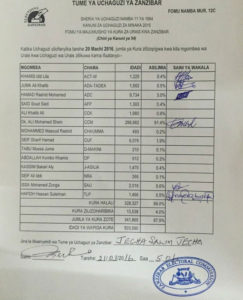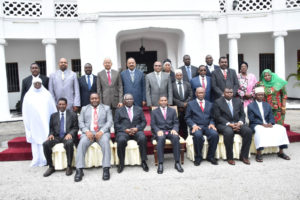by David Brewin
The elections on the mainland of Tanzania in October 2015 went well and the results seem to have been accepted by the people as having been free and fair. A detailed account of what happened and the subsequent inauguration of the new government of Tanzania were fully explained in Tanzanian Affairs No. 113.
In Zanzibar, however, elections are traditionally highly contentious and this one was no exception.
As counting of the votes was still going on, Chairman of the Zanzibar Electoral Commission (ZEC) Jecha Salim Jecha, stopped the counting and declared that the election was annulled because there had been ‘rigging’. He said that there had been irregularities on the northern island of Pemba – a stronghold of the main opposition Civic United Front (CUF) party – which had won all the seats there in the 2010 election. In some constituencies the number of voters had been greater than the number of people on the register, Jecha said, adding that there had also been fighting between members of the ZEC Council which rendered the results invalid.
The CUF opposition party declared that it had won the election by a small majority and therefore that its leader, the then First Vice-President of Zanzibar Seif Sharriff Hamad, was the new President of Zanzibar. The making of such an announcement goes against the Zanzibar Constitution which states that the results can be published only by the ZEC.
Hamad (who was also the First Vice-President of Zanzibar under the unity government), had made three previous attempts to obtain power in elections in Zanzibar, the fairness of which had been questioned at the time by several observers.
The ZEC, which includes personnel from CUF and from the ruling Chama cha Mapinduzi (CCM) party, then announced that there would be a second election, which was held on March 20th, 2016.
Translation of image above: “Mgombea” means candidate; “Chama” means party; “Idadi” – number of votes cast; “Asilimia” – percentage of votes. “Kura zilizo harabika” – spoilt votes
CUF and several very small opposition parties declared that they would not take part in this second election because it was illegal and unconstitutional. Three other small parties however took part in the election.
Before and during the second election Hamad was said to have been travelling in Saudi Arabia, Oman and Dar es Salaam for medical treatment.
Needless to say, the turnout in this second election was very different from that of the first, because of the CUF boycott. Its actual vote plummeted, and the CCM Presidential Candidate, Dr Ali Mohamed Shein, was re-elected with a huge majority.
The balance of power
For the last three years in Zanzibar, the opposition CUF party shared power, apparently amicably, with the CCM party in a Government of National Unity.
After the 2015 election in Zanzibar, CUF proposed an international mediator to help resolve the deadlock which had arisen in the Isles, but this was not accepted by the CCM. CUF then declared that it would not take part in the second election and later threatened to launch a ‘civil disobedience campaign’ against the government.
As this second election had approached, army and police forces were strengthened by the arrival in Zanzibar of reinforcements from the mainland which ensured that the election passed peacefully.
At the end of the second Zanzibar elections, the position of the CUF Party has been greatly weakened in the Zanzibar House of Assembly.
Paradoxically, however, it has strengthened its position in the National Assembly in Dar es Salaam by winning 42 seats – more than ever before. (Elections to National Assembly seats were not subject to the ZEC annulment, and so were not re-run in March).
The main opposition CHADEMA party on the mainland has also been strengthened by gains it made in new areas where it had not been present before [TA No. 113].
However, CCM now occupies 188 of the 256 contested seats in the National Assembly plus a large group of seats reserved for women, so that the CCM majority has risen to 252 seats out of the total of 364. The combined opposition parties are therefore still a long way from achieving real power in the two branches of parliament.
Furthermore, it is the President who exercises most of the power overall.
The new Zanzibar Government
Dr Shein announced the names of his new 15-member cabinet on April 9, two and a half weeks after being sworn-in as President of Zanzibar. He instructed them to work hard to respond to the expectations of the electorate or risk losing their jobs. He emphasized the importance of ‘good performance, transparency, accountability, and honesty.’ and went on to say: “We are committed to bringing changes in the islands – increasing revenue collection, minimising expenditure, increasing transparency and fighting corruption and laziness.”
The cabinet, constitutionally known as the ‘Revolutionary Council’ (RC) includes MPs from three small parties not previously involved in government including Mr Hama Rashid, the leader of the Alliance for Democratic Change (ADC), who becomes Minister for Agriculture, Natural Resources, Livestock, and Fishing. Juma Ali Khatib from the ADA-TADEA party and Said Soud Said from the Alliance for Farmers Party (AFP) have been appointed members of the Revolutionary Council or cabinet ministers without portfolio. Mr Khatib and Mr Said are new faces in the cabinet while Mr Rashid is a veteran politician who served as minister during the First Phase Union Government under Mwalimu Julius Nyerere. He was later expelled from the CCM and joined CUF until 2015 when he was expelled and joined the ADC.
Other appointees include Issa Haji Ussi (Minister of State – State House and Revolutionary Council) who had been Deputy Minister for Infrastructure and Communication; veteran Cabinet member Haroun Ali Suleiman has this time been picked as Minister of State responsible for the Constitution, Legal Affairs, the Civil Service, and Good Governance); Haji Omar Kheir, who retains his position as Minister of State (Regional Administration, Local Government and SMZ Units) and, Mohamed Aboud Mohamed who becomes Minister of State in the Second Vice-President’s Office.
Both Mr Haji and Mr Aboud have retained their positions while the former Principal Secretary (PS) in the Second Vice-President’s Office, Dr Khalid Salum Mohamed, becomes the new Minister for Finance and Development Planning.
Also in the list are Mahmoud Thabit Kombo, former Deputy Minister for Health, who has been promoted to full minister in the same ministry, and Ms Riziki Pembe Juma who takes over as Minister for Education and Vocational Training. Ms Amina Salum Ali, former Finance Minister under Dr Salmin Amour’s government in 1996 and recently retired African Union Ambassador to the United Nations, has been appointed Minister for Trade, Industries, and Marketing. Ambassador Ali Abeid Karume, son of the first Isles President of Zanzibar; Sheikh Abeid Amani Karume, becomes the new Minister for Infrastructure, Communications
and Transport.
Other appointees are Mr Rashid Ali Juma, formerly Director of the Zanzibar Municipal Council as Minister for Information, Tourism, Culture, and Sports; and Ms Maudline Castico, CCM cadre and publicist, who becomes Minister for Labour, Economic Empowerment, the Elderly plus Youth, Women, and Children, and Ms Salama Aboud Talib, who takes over as Minister for Land, Water, Energy, and Environment.
There are five Deputy Ministers who are all new faces.
Dr Shein told reporters that he had not violated the constitution by appointing three members from the Opposition to his cabinet. His new government, he said, should not be mistaken for a Government of National Unity (GNU). “It has not been possible for me to form a GNU because all the parties which took part in the re-run elections, failed to qualify.”


